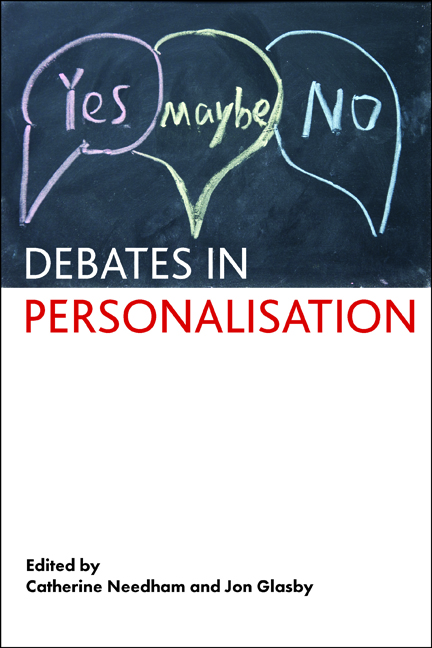Book contents
seven - Personalisation: where do carers fit?
Published online by Cambridge University Press: 04 March 2022
Summary
Introduction
Adult social care in England prioritises personalisation for service users of the support they receive (DH, 2005, 2007). Personalisation is founded on arguments about promoting choice, control and empowerment of individual service users. Individuals are conceptualised as active consumers of public services, able to exercise enhanced choice over how their needs should be met, thus experiencing greater control over their own lives. However, these arguments appear to ignore the realities of older and disabled people's lives, which are often embedded in networks of support from close kin and friends.
Carers, especially family carers, play important supporting roles in the lives of many older and disabled people. Among developed welfare states England is unusual, as carers have secured rights to assessments of their needs. Carers can also receive services (or cash grants) as well as an income replacement benefit (Carers Allowance) to support their care-giving roles (Carers [Recognition and Services] Act, 1995; Carers [Equal Opportunities] Act, 2004; HM Government, 2008). However, the arguments and assumptions underpinning personalisation – that this will promote choice, control and empowerment – appear to overlook the perspectives of carers. Arksey and Glendinning (2007), in a review of research evidence on choice and care giving, drew attention to the relative invisibility of carers in a series of policy statements on personalisation in adult social care and concluded that choice remains highly problematic for carers. Indeed, choice making is a complex process as people do not make choices in social isolation; choice making frequently involves weighing up options with others, often carers (Mitchell, 2012). However, policy and practice both reflect a widespread tendency to overlook the complex dynamics of care-giving relationships and conflate the needs and aspirations of carers and the people they support into a single (implicitly harmonious) unit. The interdependencies that often exist between disabled and older people and the relatives and friends who support them (Fine and Glendinning, 2005; Kröger, 2009) are also widely overlooked. Thus, the services and support provided to disabled or older people can have important benefits for carers too (Pickard, 2004). This impact can be both direct, where services for the disabled or older person, such as day or respite care, benefit carers by giving them a break; and indirect, if, for example, carers derive satisfaction from knowing the person they support receives appropriate, good-quality services.
- Type
- Chapter
- Information
- Debates in Personalisation , pp. 65 - 74Publisher: Bristol University PressPrint publication year: 2014



